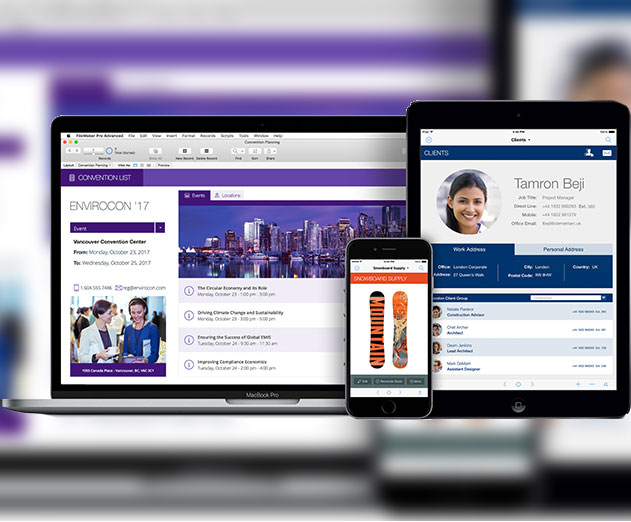Low Code No Code
FileMaker not for dummies
Thursday, September 21, 2017

|
Andy LeCates |
Why first time app developers and pros are embracing low-code and no code platforms.
Organizations large and small are looking for cost-effective alternatives that will provide the agility and productivity they need on the path to digitization. Hence the growing popularity of low-code and no-code development platforms. As more vendors come to market with these platforms, it can be tempting to dismiss these as "dumbed down" or amateur app development. That's a broad mischaracterization, however.
The analysts at Forrester Research began tracking this rapidly growing software category in 2014, defining low-code platforms as those that "enable rapid delivery of business applications with a minimum of hand-coding and minimal upfront investment in set-up, training and deployment."
Notice the phrase "a minimum of hand-coding." Low-code app development platforms take a visual, declarative or more natural language approach to the development process to achieve results. Still, just because these tools don't require, say, fluency in Javascript or Objective-C doesn't mean they lack sophistication.
With an easy-to-use platform, users can get comfortable with it while doing simple processes - the more comfortable they get, the more sophisticated they can get with the design itself.
Because much of the complexity has been removed, users can work with the platform with less concern about "doing it wrong." Once they've successfully and easily built a custom app, the process becomes less intimidating. From there, the potential opportunities are endless. The more a user experiments with the platform, the more they'll learn and the more they will be able to do with it.
However, first-timers are not the only ones using low-code platforms. Professional developers today are using them to create much more complex apps. In fact, many of these professional developers once started out as citizen developers themselves. As they've advanced into more sophisticated development projects, they've kept the low-code platforms as part of their toolboxes. These low-code platforms offer something of a multi-tiered capability - a successful app can be created without knowing coding but, likewise, a successful app of deeper sophistication can be created with code using the same platform.
Developers can tackle smaller, rapid-scale projects with these high-productivity tools that they often can't address with other kinds of development stacks. This can be for various reasons but most often comes down to affordability. When it comes to smaller projects with a shorter shelf life, it's not always economical to spend a lot of time and money. Maybe your customer only needs an app for a year, or maybe just a few months. In a situation like this, many professional developers find that a low-code platform is the most appropriate choice.
In addition, incorporating incorporate user feedback into apps during development is easier with low-code platforms. This is huge for professional developers working with clients who may not know exactly what they are looking for in a solution. Another advantage has to do with easy integration with the other infrastructure and programs that a client has in place already.
To the delight of developers, a low-code app development tool offers the benefits of lower costs, higher speed and greater productivity - getting more done for less expense in a shorter amount of time. And for a busy developer trying to juggle multiple projects of different scale and range, efficiency is key. It makes perfect sense to likewise use different types of development platforms and processes depending on which is the best fit for each.
It should be apparent by now that low-code isn't merely for "citizen developers." Far from it; platforms like this increase options and can speed development for seasoned pros as well. In addition, they save organizations money and deliver customized apps to help on the journey of digital transformation.
This content is made possible by a guest author, or sponsor; it is not written by and does not necessarily reflect the views of App Developer Magazine's editorial staff.
The analysts at Forrester Research began tracking this rapidly growing software category in 2014, defining low-code platforms as those that "enable rapid delivery of business applications with a minimum of hand-coding and minimal upfront investment in set-up, training and deployment."
Notice the phrase "a minimum of hand-coding." Low-code app development platforms take a visual, declarative or more natural language approach to the development process to achieve results. Still, just because these tools don't require, say, fluency in Javascript or Objective-C doesn't mean they lack sophistication.
Platforms like this offer individuals the chance to learn as they go and gain confidence.
With an easy-to-use platform, users can get comfortable with it while doing simple processes - the more comfortable they get, the more sophisticated they can get with the design itself.
Because much of the complexity has been removed, users can work with the platform with less concern about "doing it wrong." Once they've successfully and easily built a custom app, the process becomes less intimidating. From there, the potential opportunities are endless. The more a user experiments with the platform, the more they'll learn and the more they will be able to do with it.
However, first-timers are not the only ones using low-code platforms. Professional developers today are using them to create much more complex apps. In fact, many of these professional developers once started out as citizen developers themselves. As they've advanced into more sophisticated development projects, they've kept the low-code platforms as part of their toolboxes. These low-code platforms offer something of a multi-tiered capability - a successful app can be created without knowing coding but, likewise, a successful app of deeper sophistication can be created with code using the same platform.
Developers can tackle smaller, rapid-scale projects with these high-productivity tools that they often can't address with other kinds of development stacks. This can be for various reasons but most often comes down to affordability. When it comes to smaller projects with a shorter shelf life, it's not always economical to spend a lot of time and money. Maybe your customer only needs an app for a year, or maybe just a few months. In a situation like this, many professional developers find that a low-code platform is the most appropriate choice.
In addition, incorporating incorporate user feedback into apps during development is easier with low-code platforms. This is huge for professional developers working with clients who may not know exactly what they are looking for in a solution. Another advantage has to do with easy integration with the other infrastructure and programs that a client has in place already.
To the delight of developers, a low-code app development tool offers the benefits of lower costs, higher speed and greater productivity - getting more done for less expense in a shorter amount of time. And for a busy developer trying to juggle multiple projects of different scale and range, efficiency is key. It makes perfect sense to likewise use different types of development platforms and processes depending on which is the best fit for each.
It should be apparent by now that low-code isn't merely for "citizen developers." Far from it; platforms like this increase options and can speed development for seasoned pros as well. In addition, they save organizations money and deliver customized apps to help on the journey of digital transformation.
This content is made possible by a guest author, or sponsor; it is not written by and does not necessarily reflect the views of App Developer Magazine's editorial staff.

Become a subscriber of App Developer Magazine for just $5.99 a month and take advantage of all these perks.
MEMBERS GET ACCESS TO
- - Exclusive content from leaders in the industry
- - Q&A articles from industry leaders
- - Tips and tricks from the most successful developers weekly
- - Monthly issues, including all 90+ back-issues since 2012
- - Event discounts and early-bird signups
- - Gain insight from top achievers in the app store
- - Learn what tools to use, what SDK's to use, and more
Subscribe here









